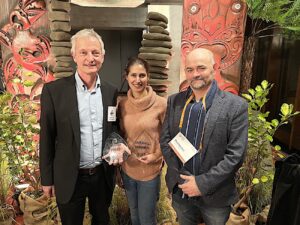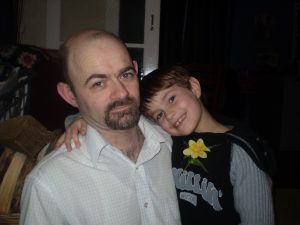
FFA overall winners SuperPro with advisor Paul Spence.
Over a decade ago MacDiarmid Institute founder, renown physicist and technology entrepreneur the late Professor Sir Paul Callaghan proclaimed that we needed to make New Zealand “the place where talent wants to live”. This week’s result from the Food, Fibre & Agritech Supernode Challenge suggests we have reasons to be optimistic.
During the last few weeks it has been my great pleasure to be mentoring some of the teams involved in the 2022 Food, Fibre and Agritech Supernode Challenge accelerator programme, in my capacity as an advisor with ThincLab Canterbury. The Challenge, supported by ChristchurchNZ, KiwiNet and the Canterbury Mayoral Forum seeks to uncover innovative ideas with commercalisation potential from across research and business. Notably environmental sustainability has been a key theme that we asked applicants to address. 36 applications were whittled down to 24 participating teams, of which 12 finalists were selected.
Canterbury has a long and rich association with agricultural and is home to two universities and numerous land based research institutions. So there is no shortage of talent on offer. It has been an absolute thrill to see our young skilled migrants strongly represented among the participants in this programme. For many of them it has been a steep learning curve stepping out of the research lab and grappling with the fundamentals of business for the first time. But in every case they have grasped the opportunity and run with it.
Challenge overall winners Mahnaz Shaverdi and Associate Professor Ken Morison are food process engineering researchers from the University of Canterbury with big plans for turning plain old pea protein into a more desirable food source. Shaverdi moved from Iran with the aim of studying and raising her young family in New Zealand and Morison is a research engineer who returned to work in the dairy industry after completing his doctorate at Imperial College in London. Commercialisation of their research is timely. Plant-based ingredients are one of the fastest growing food categories globally, as witnessed through the recent investment by Khosla Ventures in Canterbury plant protein processor Leaft Foods.
Some commentators have been worrying lately that our technology startup ecosystem lacks diversity. But at a time when the world needs many bright minds to be working on solving a myriad of social, economic and environmental problems that confront us, it is exciting to know that our skilled migrants are making an increasingly significant contribution. This is a success story that we rarely hear about and that needs to be told more often. I’m sure Sir Paul Callaghan would be encouraged by this progress.
Paul Spence is a commentator and serial entrepreneur, a recently exited co-founder of a New Zealand based technology venture, a co-founder and director of Creative Forest, principal at GeniusNet Research and an advisor at ThincLab. You can follow Paul on Twitter @GeniusNet or sign up for a free weekly digest of startup, tech and innovation related events curated by him through New Zealand Startup Digest.


 The pandemic induced economic crisis has raised awareness that economies remain fragile since the GFC and that we must urgently shift to more sustainable and environmentally sound forms of economic development if we are to survive as a species. As a nation in the spotlight right now, New Zealand has an opportunity to lead with change. But we need a vehicle to drive this process and we must shift the mindset of the nation towards environmental entrepreneurship.
The pandemic induced economic crisis has raised awareness that economies remain fragile since the GFC and that we must urgently shift to more sustainable and environmentally sound forms of economic development if we are to survive as a species. As a nation in the spotlight right now, New Zealand has an opportunity to lead with change. But we need a vehicle to drive this process and we must shift the mindset of the nation towards environmental entrepreneurship. This week I gave my young son a tearful hug and watched him cross through airport security to join the first leg of a long journey to Europe. I found myself, reviewing the previous eighteen years and wondering whether or not I had done enough for him. His mother and I have a solid friendship now, but we separated when he was just two. So co-parenting presented numerous challenges for us for many years. Not the least of those was that (despite his intelligence) my son sometimes struggled within the school system. At times it broke my heart and I often felt like I badly let him down. But what I have found out since we began researching our new project
This week I gave my young son a tearful hug and watched him cross through airport security to join the first leg of a long journey to Europe. I found myself, reviewing the previous eighteen years and wondering whether or not I had done enough for him. His mother and I have a solid friendship now, but we separated when he was just two. So co-parenting presented numerous challenges for us for many years. Not the least of those was that (despite his intelligence) my son sometimes struggled within the school system. At times it broke my heart and I often felt like I badly let him down. But what I have found out since we began researching our new project